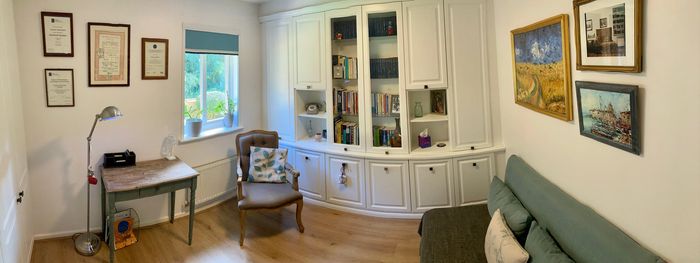Consultation and Psychotherapy



I am a Chartered Psychologist and Child and Adolescents Psychotherapist registered with the Association of Child Psychotherapists (ACP https://childpsychotherapy.org.uk) and with the British Psychoanalytic Council https://www.bpc.org.uk. Chartered Member Specialising in Psychotherapy (RoPSiP) of The British Psychological Society, Member of the BPS Register of Applied Psychology Practice Supervisors (RAPPS); Member of the Association for Psychodynamic Practice and Counselling in Organisational Settings (APPCIOS http://appcios.info/).
I am registered as Psychologist and Psychotherapist with the Italian Professional Body http://www.psy.it/. I Specialized in Psychoanalytic Psychotherapy, completing the training at the ISTEBA Institute in Rome, under the influence of Gaddini's thoughts, linked to the work of D.W.Winnicott.
I completed a Bachelor in Psychology on March 2006 at the LUMSA University of Rome, and a Master Degree in Clinical and Community Psychology on April 2009 at the same University.
In 2010 I was appointed Juvenile Guardian at the Juvenile Court of Rome where I supported and represented minors and children deemed adoptable.
I worked as a voluntary Psychologist for Public Mental Health Services (in Fiumicino, Roma, Italy) in which I provided psychological consultation and therapy to adults, adolescents and parents. From September 2010 to November 2014 I have completed an internship placement in a residential home for adult and children suffering from cancer at the San Camillo – Fornalini Hospital in Rome, Italy. I worked for some years in my own private practice in Rome as a Child Psychologist and a trainee Psychoanalytic Psychotherapist. I also worked as a Child Psychologist in a children care home in Rome for four years. In 2014 I moved to the UK and worked for 6 years as Consultant Psychologist and Psychotherapist in Therapeutic Communities; worked for 3 years at NorPIP (Northamptonshire Parent Infant Partnership) as a Parent Infant Therapist and as Clinical Operations Lead. From April 2022 to April 2023 I participated to a pilot project as Youth Therapist in Primary Care Setting. I am currently working as Psychotherapist in private practice, in Fostering Agencies and as Senior Child and Adolescent Psychotherapist in CAMHS. I am member of the Scientific Committe of Palermo University Press Psicologia delle relazioni.
I have a professional facebook page where I publish news and articles mainly in Italian but also in English. Click on Psicologia no limits to visit the page.

Provide consultation and psychotherapy services to:
adults
parents
adolescents
children
Therapeutic supervision to other professionals.
The Psychodynamic Approach
The Psychodynamic approach to counselling and therapy puts great emphasis on the therapist’s ability to use what happens in the immediate, unfolding relationship between patient (client) and therapist to explore the types of feeling and relationship dilemmas that have caused difficulties for the patient in his or her everyday life. The aim of psychodynamic therapy is to help patients to achieve insight (the capacity to gain an accurate and deep understanding of someone or something) and understanding around the reasons for their problems, and translate this insight into a mature capacity to cope with any future difficulties. To enable this process to take place, the therapist needs to be able to offer the patient an environment that is sufficiently secure and consistent to permit safe expression of painful or shameful fantasies and impulses. It is a safe, nurturing environment and non-judgemental relationship with the therapist. Its purpose is to overcome obstacles that prevent someone from being able to thrive and fulfil their potential. It can be long or short-term, and will always begin with an initial session or sessions to discuss the needs and wishes of each person. For more information visit the BPC website https://www.bpc.org.uk/about-psychotherapy/what-psychotherapy

Child and Adolescent Psychotherapists are skilled in the assessment and treatment of children and young people, and are trained (infant and child observation) to carefully observe them and respond to what they might be communicating through their behaviour and play. They tailor their approach to the individual child and work in an age-appropriate way, for example using play or drawing with younger children but talking about feelings with teenagers. The relationship between the child and the therapist is central to treatment. Child and Adolescent Psychotherapists may see children and young people individually or with other family members. The therapeutic relationship is developed through talking or play, depending on age. The child has an opportunity to work towards a better understanding of themselves, their relationships and their established patterns of behaviour. Psychotherapists also apply their framework of thinking to work with parents, families and carers and to training and supporting other professionals who work with children, young people and families to encourage a deeper understanding of the child's perspective.

Parent-infant psychotherapy (PIP) is supportive psychotherapy intended to address problems in the parent-infant relationship, and problems such as excessive crying and sleeping/eating difficulties. A parent-infant therapist works directly with the parent and infant to identify unconscious patterns of relating and behaving, and influences from the past that are impeding the parent-infant relationship.
The aims are not only to meet the immediate presenting problems in the baby or the toddler, but also to help the parent and child feel more positively about themselves and their interaction.
Parents and their infants are going through a process of change in early development. In parent-infant psychotherapy, questions, worries and concerns are raised and addressed by focusing on the interaction between parent and baby This interaction goes on largely nonverbally. The parent-infant therapist is trained to pick up nuances of the relationship and put them into words, so the infant and parent can develop or continue to develop a healthy attachment.
The therapist helps the parent observe and address what works to reach the baby. The infant’s reactions to modifications lead to the next step in the therapeutic process until the problems are resolved.
http://psychoanalysis.columbia.edu/patients/children-and-teens/parent-infant-psychotherapy



The only person with whom you have to compare yourself
is you in the past.
Sigmund Freud
Northampton, Northamptonshire, England, United Kingdom
Monday - Friday: by appointment
Saturday and Sunday: Closed